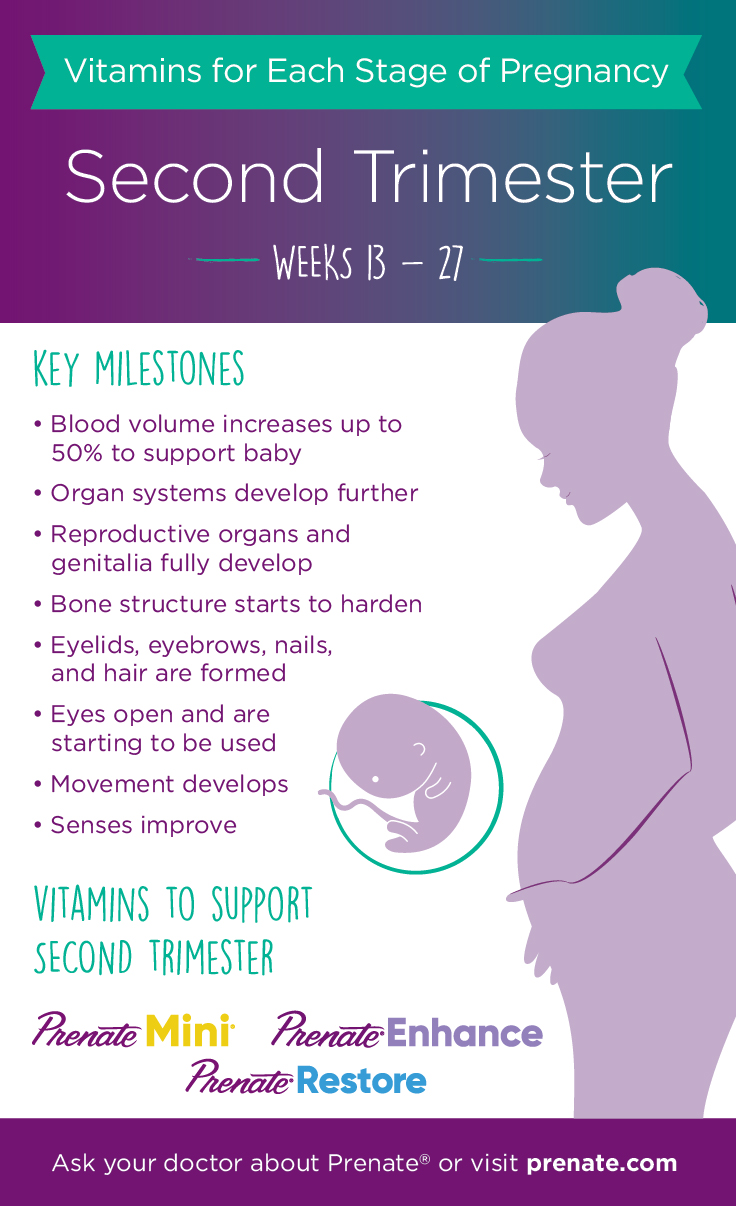Prenatal Vitamins for Each Stage of Pregnancy: Second Trimester – Months 4 to 6
September 10, 2017
Many of the major physical changes that women experience during pregnancy occur during the second trimester. The uterus and abdomen expand to make room for a baby, and the level of pregnancy hormones continues to increase. A growing belly and breasts also are trademarks of the second trimester. But for many women, these are the easiest months of pregnancy. They feel their energy start to return, and they begin making plans for their baby’s arrival.
While many women feel better during the second trimester of pregnancy, there are still major changes taking place inside their bodies as their babies grow and develop. The second trimester requires essential nutrients to support that growth.
Key Developmental Milestones in the Second Trimester:
- Organ systems develop further
- Reproductive organs and genitalia fully develop
- Bone structure starts to harden
- Eyelids, eyebrows, nails and hair are formed
- Eyes open and are starting to be used
- Movement develops
- Senses improve
In addition, a mother’s blood volume increases up to 50 percent during the second trimester to support her baby.
Prenatal Vitamins for the Second Trimester
While a balanced diet is preferred, some women may have trouble meeting their daily recommended intakes for certain vitamins and minerals. The Prenate® Vitamin Family offers a line of prenatal vitamins that are designed to carry moms and babies through preconception to pregnancy and into the weeks and months after delivery.
These vitamins are specifically formulated to fit the needs of the second trimester:
- Prenate Mini® is a small but robust softgel prenatal supplement with 14 nutrient forms.
- Prenate® Enhance is a prenatal vitamin with 400 mg of DHA, 25 mcg of vitamin D, and chelated iron.
- Prenate® Restore is the only Prenate® prenatal vitamin with probiotics, plus DHA and chelated iron.
These prenatal vitamins contain key nutrients to help support second trimester developmental milestones:
- Vitamin D – The U.S. Food and Drug Administration recommends that pregnant and lactating women consume 400 IU of vitamin D daily.1 One of the primary benefits of vitamin D is in maintaining and building bone mineralization. Vitamin D works to increase the body’s absorption of calcium, which helps build a strong skeletal system.2 Because a baby’s body doubles in length in the second trimester, it is especially important for an expecting mother to meet her daily vitamin D requirements during this time. Otherwise, nutrients are taken away from the mother and preferentially partitioned to the baby.3 However, vitamin D does not only help build and maintain healthy bones. Ample vitamin D supplies also may help reduce the mother’s risk of developing preeclampsia and gestational diabetes.4
- Calcium – The U.S. Food and Drug Administration recommends that pregnant and lactating women get 1,300 mg of calcium daily.1 As with vitamin D, a baby draws calcium from the mother’s bones if the baby’s need for calcium is not met.5 Calcium also plays a role in developing and maintaining bone strength and healthy teeth, and helps the heart, nerves, muscles and other body systems work properly.6 Calcium supplementation appears to be beneficial for pregnant women who are at high risk of gestational hypertension.7 Calcium supplementation during pregnancy also may reduce systolic and diastolic blood pressure and the risk of preeclampsia.8
- Iron – The U.S. Food and Drug Administration recommends that pregnant women get 18 mg of iron daily.1 During pregnancy, a woman’s blood volume increases 50 percent, and her need for hemoglobin is greater. Iron is an essential mineral in the body’s formation of hemoglobin, the red protein in the blood that is responsible for transporting oxygen throughout the body. Sufficient iron consumption during the second trimester helps a growing baby receive the amount of oxygen needed to develop a strong heart, lungs and muscles. In addition, it helps moms maintain a healthy immune system and prevent anemia.
- DHA – The National Institutes of Health recommend that women consume 300 mg of DHA during the first trimester of pregnancy.9 DHA is essential for growth and functional development of an infant’s brain.10,11 During the second trimester, when the baby’s body is dramatically developing, DHA aids in a healthy birth weight and the length of gestation.12,13
Talking to your Healthcare Provider About Prenatal Vitamins
These essential nutrients should be included in every prenatal diet during the second trimester. The Prenate® Vitamin Family helps support expecting moms with robust doses of key nutrients. Talk to your doctor to see if a Prenate® prenatal vitamin may be right for you to help fill nutritional gaps.









